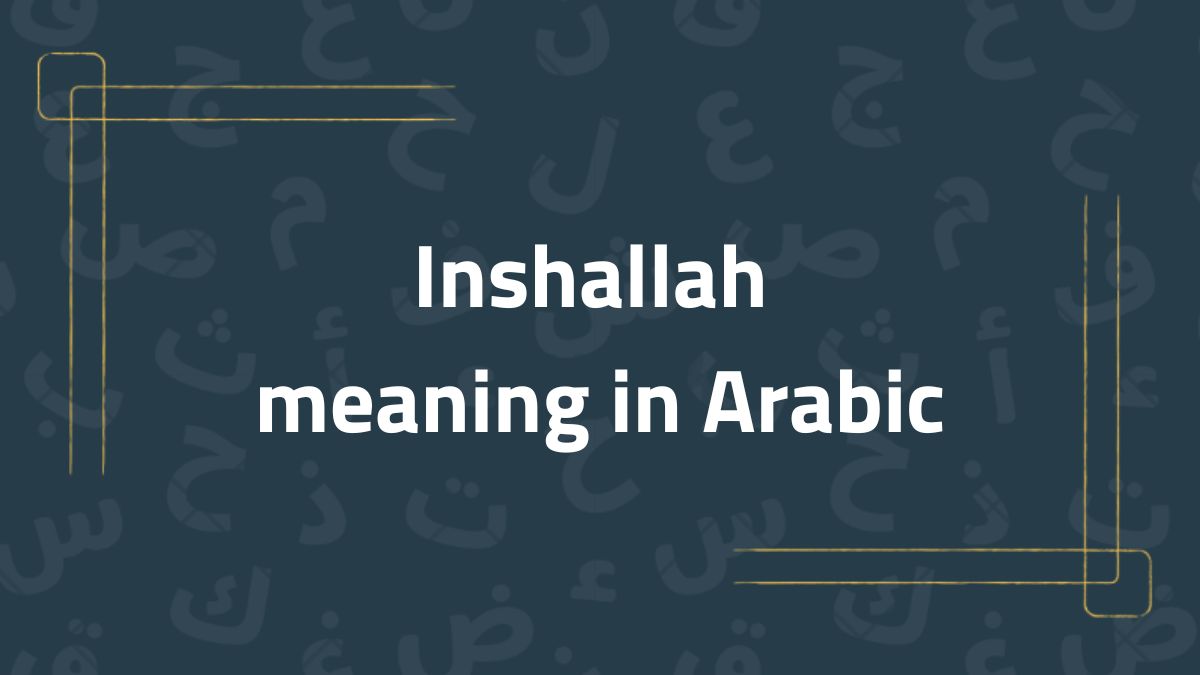The Word Inshallah in Arabic Meaning With Examples

The Arabic word “Inshallah” (إن شاء الله) is widely used in daily conversations among Arabic speakers and holds deep cultural and religious significance. It translates to “if God wills” or “God willing” in English. This article explains the meaning, linguistic roots, usage in sentences, and its importance in Islamic culture and the Quran.
The Meaning of “Inshallah” in Arabic
“Inshallah” means “if God wills” in English. It expresses hope that something will happen, but only if God permits it. The pronunciation is “in-shaa-Allah,” with emphasis on the second syllable. Muslims and Arabic speakers use it to acknowledge that all events depend on God’s will.
Linguistic Root and Grammatical Usage
The word “Inshallah” comes from three Arabic root letters: ش (Shin), ي (Ya), and ء (Hamza), forming the verb “sha’a” (شاء), meaning “to will” or “to wish.” The phrase is a combination of:
-
“In” (إن) – meaning “if”
-
“Sha’a” (شاء) – meaning “willed”
-
“Allah” (الله) – meaning “God”
Grammatically, it is a conditional phrase and remains the same in different sentence structures.
Examples of “Inshallah” in Arabic Sentences
-
سَأَزُورُكَ غَدًا إِنْ شَاءَ اللَّهُ
“I will visit you tomorrow, God willing.” -
سَنُسَافِرُ إِلَى مَكَّةَ إِنْ شَاءَ اللَّهُ
“We will travel to Makkah, God willing.” -
سَتَتَحَسَّنُ صِحَّتُكَ إِنْ شَاءَ اللَّهُ
“Your health will improve, God willing.”
Cultural or Quranic Significance of “Inshallah”
“Inshallah” appears in the Quran multiple times, emphasizing reliance on God’s will. One key verse is:
وَلَا تَقُولَنَّ لِشَيْءٍ إِنِّي فَاعِلٌ ذَٰلِكَ غَدًا إِلَّا أَن يَشَاءَ اللَّهُ
“And never say of anything, ‘I will do that tomorrow,’ except [when adding], ‘If God wills.'” (Quran 18:23-24)
This teaches Muslims to always acknowledge God’s control over future events. Culturally, saying “Inshallah” shows humility and faith.
Common Misunderstandings or Mistakes
Some learners confuse “Inshallah” with “Mashallah” (ما شاء الله), which means “God has willed it” and is used to express appreciation. Another mistake is misspelling it as “Insha Allah” without proper Arabic grammar rules.
Why You Should Learn “Inshallah”
Understanding “Inshallah” helps in daily conversations with Arabic speakers and deepens knowledge of Islamic culture. It is essential for Quranic studies and respectful communication in Muslim-majority countries.
Conclusion
“Inshallah” is a meaningful Arabic phrase used to express hope while recognizing God’s will. Its roots in the Quran and daily speech make it important for learners. By using it correctly, you show respect for Arabic language and Islamic traditions.
This article covers the meaning of “Inshallah” in Arabic, its Quranic importance, and practical examples. Whether for language study or cultural understanding, mastering this word is valuable.
Discover the Quran and Arabic with Shaykhi Academy
We highly recommend Shaykhi Academy for anyone seeking to learn the Quran and Arabic with excellence. The academy is known for combining expert teaching with a compassionate approach, making it a top choice for students worldwide who want to connect deeply with the words of Allah.
At Shaykhi Academy, you’ll find highly qualified teachers who specialize in guiding learners of all ages and levels. Whether you’re just beginning your journey with Arabic letters or aiming to master Tajweed and Quran recitation, their personalized lessons ensure steady progress at your own pace.
With engaging classes, flexible scheduling, and a focus on both spiritual and linguistic growth, Shaykhi Academy makes learning both enjoyable and impactful.
Watch a sample class below to see Shaykhi Academy in action:
Learn Arabic, Quran, And Tajweed With Free Trial!
Make your home a place of faith, understanding, and connection with the Quran. Whether you're starting from scratch or deepening your knowledge, Shaykhi Academy is here to guide you — step by step. ✅ Tailored for all ages ✅ Clear, structured learning ✅ Flexible online sessions ✅ Book your free trial session now!
Learn More
